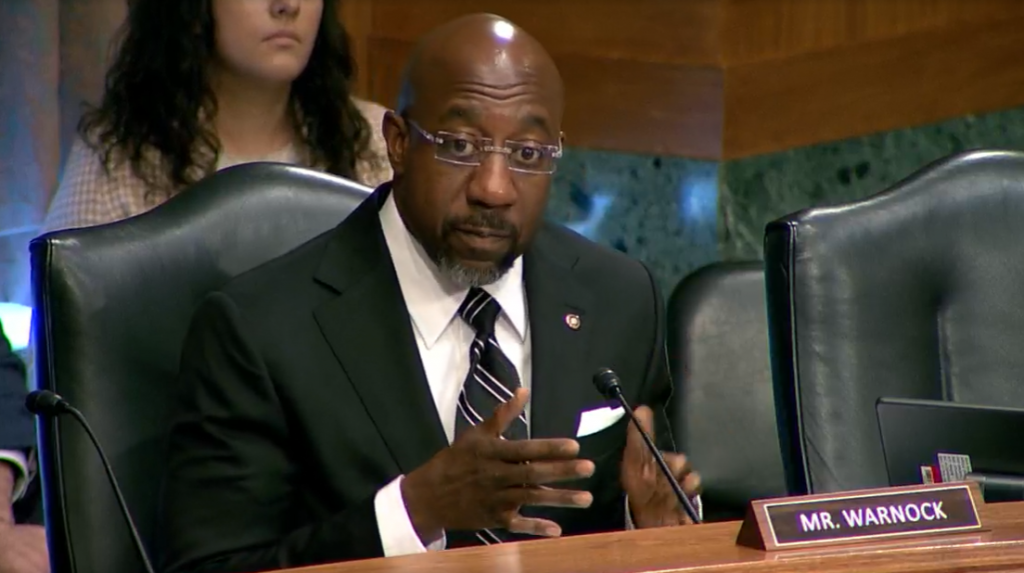At a Wednesday Senate Banking subcommittee hearing, Senator Reverend Warnock questioned expert agriculture and grocery sector witnesses on the narrow profit lines for farmers and how weak competition in the grocery sector leads to expensive grocery bills
During the hearing, Senator Reverend Warnock questioned farmer Joe Maxwell, Chief Strategy Officer of Farm Action, and Dr. Lindsay Owens Executive Director of Groundwork Collaborative
Senator Reverend Warnock’s questioning highlighted the thin profit margins for American farmers and how increased competition could help lower prices of consumer grocery bills
Senator Reverend Warnock: “I’ve had many conversations with farmers all across Georgia, it is a tough business, the margins are very narrow […] Small and midsized farmers get squeezed from both sides”

Watch Senator Reverend Warnock at Wednesday’s hearing HERE
Washington, D.C. – Today U.S. Senator Reverend Raphael Warnock (D-GA) highlighted how corporate price gouging and consolidation leaves American farmers with an almost nonexistent profit margin, at the expense of consumers, and how increased competition can lower the costs of grocery bills for hardworking Georgians while questioning expert agriculture witnesses during a subcommittee hearing. The hearing, titled “Protecting Consumers’ Pocketbooks: Lowering Food Prices and Combatting Corporate Price Gouging and Consolidation,” featured witness testimony from Dr. Lindsay Owens the Executive Director of Groundwork Collaborative and Joe Maxwell a farmer and the Chief Strategy Officer of Farm Action.
“I’ve had many conversations with farmers all across Georgia. It is a tough business, the margins are very narrow […] small and midsized framers get squeezed from both sides,” said Senator Revered Warnock. “In short, farmers are either forced to get big, or get out.”
Senator Warnock, who also sits on the Senate Agriculture committee, has long been a strong supporter of America’s farmers and rural communities. Senator Warnock successfully secured provisions from every piece of agriculture legislation he has introduced since being sworn into office in 2021 in Senate Democrats’ recently-released Farm Bill framework. Additionally, last year, the Senator introduced the Promoting Precision Agriculture Act, which would help establish interconnectivity standards to better communicate and share data; Senator Warnock visited the University of Georgia’s Iron Horse research farm in Watkinsville to see precision agriculture research firsthand and speak with local producers on how modernizing precision agriculture technologies can help support Georgia’s farmers and economy.
Watch the Senator’s full remarks and line of questioning HERE
See below a transcript of key exchanges between Senator Warnock and the expert witnesses:
Senator Reverend Warnock (SRW): “When grocers consolidate, farmers have few options to sell their goods. As a result of this, they have less negotiation power when it comes to securing contracts, so their hands are tied”
“I’ve had many conversations with farmers all across Georgia, it is a tough business, the margins are very narrow […] In order to cut down on their bottom line, grocers often require farmers to fulfill larger and larger contracts at lower and lower prices and so it becomes a volume business. Small and midsized framers get squeezed from both sides because they can’t produce the quantity required at the prices demanded by these big retailers. In short, farmers are either forced to get big, or get out.”
“Mr. Maxwell, you’re a farmer, what pressures are you and your fellow farmers feeling right now because of this reality?”
Joe Maxwell, Farmer, Chief Strategy Officer of Farm Action (JM): “Senator you described the reality of market opportunity, we would suggest that in most instances the market is dead, the farmers become prices takers. They no longer have the ability to recover the production of cost, and far too often because of concentration are relying on government subsidies in order to make a profit at the end of the year.”
“When the government increases those subsidies, like reference pricing, then those companies like I testified earlier, simply set a higher price to the farmer, because they know the farmer is going to receive more funds, they just go after it, because there is no competition.”
“That’s the reality that we’re living in. Squeezed from both ends and trying to wiggle in the middle, just so there can be the next generation on our farm.”
SRW: “Decreased competition impacts all the way down the food chain, […] all the way down to the consumer?”
JM: “The concentration impacts the input prices to farmers who are consumers, and then ultimately those prices move into the stream forcing the retail consumer, grocery retail consumer, to see higher prices in the grocery store”
SRW: “Analysis from the Reinvestment Fund finds that nearly 1 million Georgians live in a community with limited access to a grocery store, a 15% increase over the prior decade, USDA has found greater consolidation in rural counties than in larger markets.”
“While rural communities are responsible for producing the food that feeds our country, rural residents are often some of the most food insecure, ironically. And we know that people of color in rural areas are more likely to face hunger because of a lack of food access.”
“Dr. Owens because of a consolidated grocery industry, many rural Americans must travel further to the grocery store, often with fewer nutritious and healthy options. How would more competition in the grocery sector benefit rural communities?”
Dr. Lindsay Owens, Executive Director, Groundwork Collaborative: “Grocery inflation in rural areas is running above grocery inflation in other areas. More competition and more access to more and different grocers in rural areas would absolutely help families get better deals at the grocery store.”
###